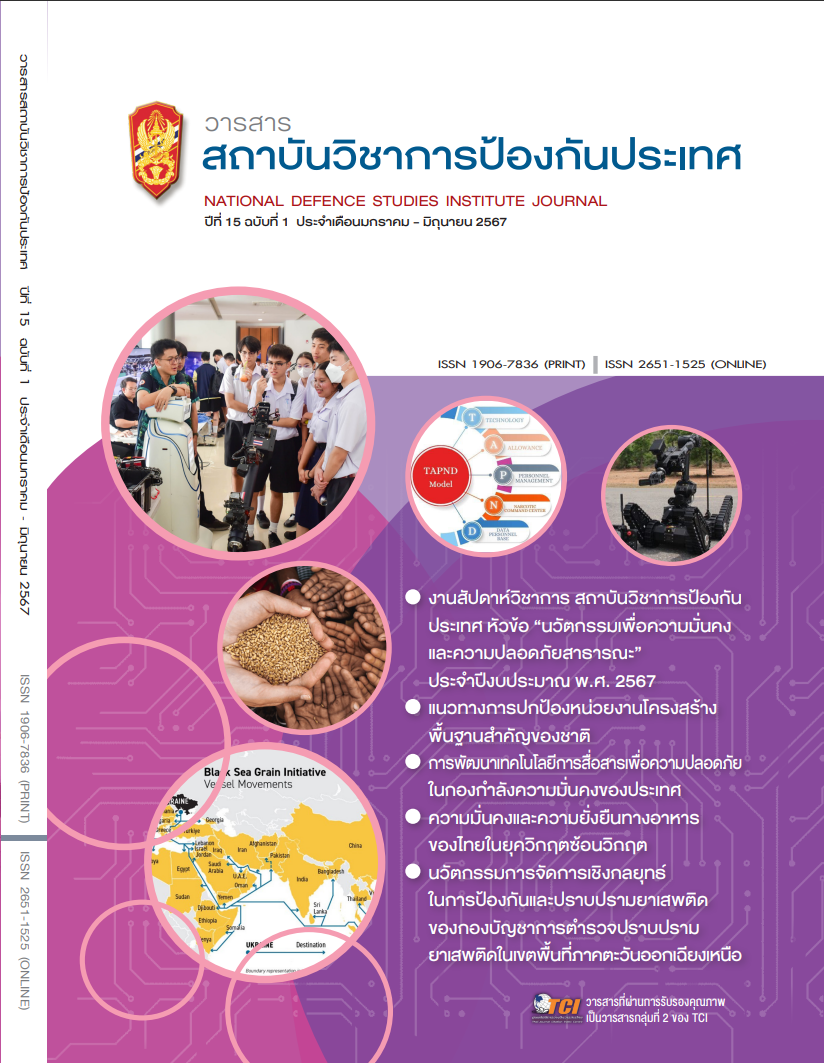The Micro-learning Model Mixed with Gamification via Metaverse to Create Characteristics of Digital Citizenship for Military Craftsman Students
Main Article Content
Abstract
The micro-learning model mixed with gamification via metaverse is a research tool that was devised by integrating the micro-learning process with gamification. Once applied in instructional management and assisted by metaverse technology, this model is believed to stimulate students to have more interest in learning, develop their critical thinking skills, and increase the efficiency of learning. The objectives of this research are 1) to analyze and synthesize the conceptual framework of the micro-learning model mixed with gamification via metaverse to create characteristics of digital citizenship for military craftsman students, 2) to design the micro-learning model mixed with gamification via metaverse to create characteristics of digital citizenship for military craftsman students, and 3) to study the results after using the design of the micro-learning model mixed with gamification via metaverse to create characteristics of digital citizenship for military craftsman students. The study group in this research is 10 experts from various higher education institutions, all of whom were derived by means of purposive sampling and are specialized in the design and development of instruction systems. The research instruments consist of (1) the micro-learning process mixed with gamification via metaverse, (2) the micro-learning model mixed with gamification via metaverse, and (3) the evaluation form for the suitability of the micro-learning model mixed with gamification via metaverse. The results of this research show that (1) the micro-learning model mixed with gamification via metaverse comprises 4 main elements, i.e., input factor, the micro-learning process mixed with gamification via metaverse, output factor, and feedback, and (2) the suitability of the overall elements of the micro-learning model mixed with gamification via metaverse is at a very high level. According to the research results herein, it can be clearly seen that the micro-learning model mixed with gamification via metaverse to create characteristics of digital citizenship for military craftsman students is suitable enough to be applied to further develop other micro-learning platforms mixed with gamification via metaverse, which can be put in practical use in an effective manner.
Article Details

This work is licensed under a Creative Commons Attribution-NonCommercial-NoDerivatives 4.0 International License.
The articles, images, tables, graphs, written content, and opinions published in this journal are solely those of the authors and do not necessarily reflect the views or positions of the National Defence Studies Institute or its academic affiliates.
References
ชนัตถ์ พูนเดช และธนิตา เลิศพรกุลรัตน. (2563). การศึกษานวัตกรรมการเรียนรู้ด้วยแนวคิดเกมมิฟิเคชัน. วารสารศึกษาศาสตร์ มหาวิทยาลัยนเรศวร, 22(2). สืบค้นเมื่อ 28 ธันวาคม 2566, จาก https://ir.swu.ac.th/jspui/ bitstream/123456789/28885/1/IIE-Chanat-P-2563.pdf
ชยางกูร ภักดีพัฒนกุล และสิรินธร สินจินดาวงศ์. (2565). การออกแบบกิจกรรมการเรียนรู้เชิงรุกส่งเสริมทักษะ การเขียนเนื้อหาในสื่อวิดิโอไมโครเลิร์นนิง. Journal of Information and Learning, 34(2). สืบค้นเมื่อ 28 ธันวาคม 2566. จาก https://so04.tci-thaijo.org/index.php/jil/article/view/261393/180387
ธนะรัตน์ กิ่งช้าง และพินันทา ฉัตรวัฒนา. (2566). รูปแบบการเรียนรู้กิจกรรมเป็นฐานโดยใช้ไมโครเลิร์นนิงแบบมีปฏิสัมพันธ์ผ่านสื่อเสมือนจริงบนชุมชนการเรียนรู้ผ่านคลาวด์เพื่อเสริมสร้างทักษะการรู้ดิจิทัล. วารสารวิชาการ ครุศาสตร์อุตสาหกรรมและวิศวกรรมศึกษา, 14(1), 13-22.
เบญจภัค จงหมื่นไวย์, กริช กองศรีมา, แสงเพ็ชร พระฉาย, สายสุนีย์ จับโจร, และอรัญ ซุยกระเดื่อง. (2561). เกมมิฟิเคชัน เพื่อการเรียนรู้. วารสารโครงงานวิทยาการคอมพิวเตอร์และเทคโนโลยีสารสนเทศ, 4(2), 34-43.
ประคอง กรรณสูต. (2538). สถิติเพื่อการวิจัยทางพฤติกรรมศาสตร์ (ฉบับปรับปรุงแก้ไข). กรุงเทพฯ: สำนักพิมพ์จุฬาลงกรณ์มหาวิทยาลัย.
พจนา เปลี่ยนเกิด. (2566). แนวทางการพัฒนาทักษะด้านดิจิทัลเพื่อรองรับการเปลี่ยนแปลงสู่องค์กรดิจิทัลของกองบัญชาการกองทัพไทย. วารสารสถาบันวิชาการป้องกันประเทศ, 14(1), 94-105.
วรรณธิดา ยลวิลาศ. (2562). การสร้างแรงจูงใจในการเรียนรู้ด้วยเกมมิฟิเคชัน ใน การประชุมวิชาการระดับชาติและนานาชาติมหาวิทยาลัยกาฬสินธุ์ ครั้งที่ 1. นวัตกรรมด้านวิทยาศาสตร์และสังคมศาสตร์เพื่อความยั่งยืน (378-391). กาฬสินธุ์ : มหาวิทยาลัยกาฬสินธุ์.
วรลักษณ์ สงวนแก้ว. (2559). Digital Citizens: พลเมืองดิจิทัล. สืบค้นเมื่อ 28 ธันวาคม 2566. จากhttps://www.stou. ac.th/study/sumrit/1-59(500)/page2-1-59(500).html
ศยามน อินสะอาด. (2561). การออกแบบบทเรียนอีเลิร์นนิงเพื่อพัฒนาทักษะการคิดขั้นสูง. กรุงเทพฯ: บริษัท ซีเอ็ดยู เคชั่น จำกัด.
สิริโชติ บริบูรณ์ทรัพย์ และศรีสมร พุ่มสะอาด. (2562). การจัดการเรียนรู้โดยวิธีการบูรณาการเทคโนโลยีสารสนเทศ และการสื่อสาร เรื่อง ทรานสดิวเซอร์และเซนเซอร์ของนักเรียนช่างอิเล็กทรอนิกส์ โรงเรียนช่างฝีมือทหาร. วารสารสถาบันวิชาการป้องกันประเทศ, 10(3), 73-83.
สุพัตรา เสภัยยันต์ และพินันทา ฉัตรวัฒนา. (2566). รูปแบบการเรียนรู้จินตวิศวกรรมทางเทคโนโลยีด้วยการเล่าเรื่องผ่านจักรวาลนฤมิตเพื่อเสริมสร้างทักษะการออกแบบเชิงวิศวกรรม. วารสารครุศาสตร์อุตสาหกรรม, 22(1), 49-60.
สุรพล บุญลือ. (2560). การวิจัยโดยใช้เกมมิฟิเคชันเป็นฐานสำหรับการเรียนรู้ในศตวรรษที่ 21. สืบค้นเมื่อ 28 ธันวาคม 2566. จาก https://www.slideshare.net/SuraponBoonlue/ss-73604198
สำนักนโยบายและแผนการศึกษาขั้นพื้นฐาน, กลุ่มวิจัยและพัฒนานโยบาย. (2563). นโยบายสำนักงานคณะกรรมการการศึกษาขั้นพื้นฐาน ปีงบประมาณ พ.ศ. 2563. สืบค้นเมื่อ 28 ธันวาคม 2566. จาก https://spmphet.go.th/ wp-content/uploads/2021/08/นโยบาย-สพฐ.-ปี-2563-1.pdf
เอนก เหล่าธรรมทัศน์. (2554). การเมืองภาคพลเมือง (พิมพ์ครั้งที่ 3). กรุงเทพฯ: สถาบันพระปกเกล้า.
Javorcik, T., Kostolanyova, K., & Havlaskova, T. (2023). Microlearning in the Education of Future Teachers: Monitoring and Evaluating Students’ Activity in a Microlearning Course. The Electronic Journal of e-Learning, 21(1). Retrieved January 10, 2024 from https://doi.org/10.34190/ejel.21.1.2623
Kao, R. (2019). Tips on Constructing Inclusive and Equitable Guided Microlearning Inquiry Questions to Clarify Topics in General Biology. Preprints. Retrieved January 12, 2024 from https://doi. org/10.20944/preprints201912.0236.v1
Muengsan, S. & Chatwattana, P. (2024). The Game-based Learning (GbL) Platform with Generative AI to Enhance Digital and Technology Literacy Skills. Higher Education Studies, 14(1). Retrieved February 14, 2024 from https://doi.org/10.5539/hes.v14n1p46
Rafli, M. A., & Adri, M. (2022). Pengembangan Micro-Learning Pada Mata Kuliah Kewirausahaan di Universitas Negeri Padang Berbasis Media. Jurnal Pendidikan Tambusai, 6(1), Retrieved December 28, 2023 from https://jptam.org/index.php/jptam/article/view/3044
Robson, K., Plangger, K., Kietzmann, J. H., McCarthy, I., & Pitt, L. (2015). Is it all a game? Understanding the principles of gamification. Business Horizons, 58(4), 411-420.


